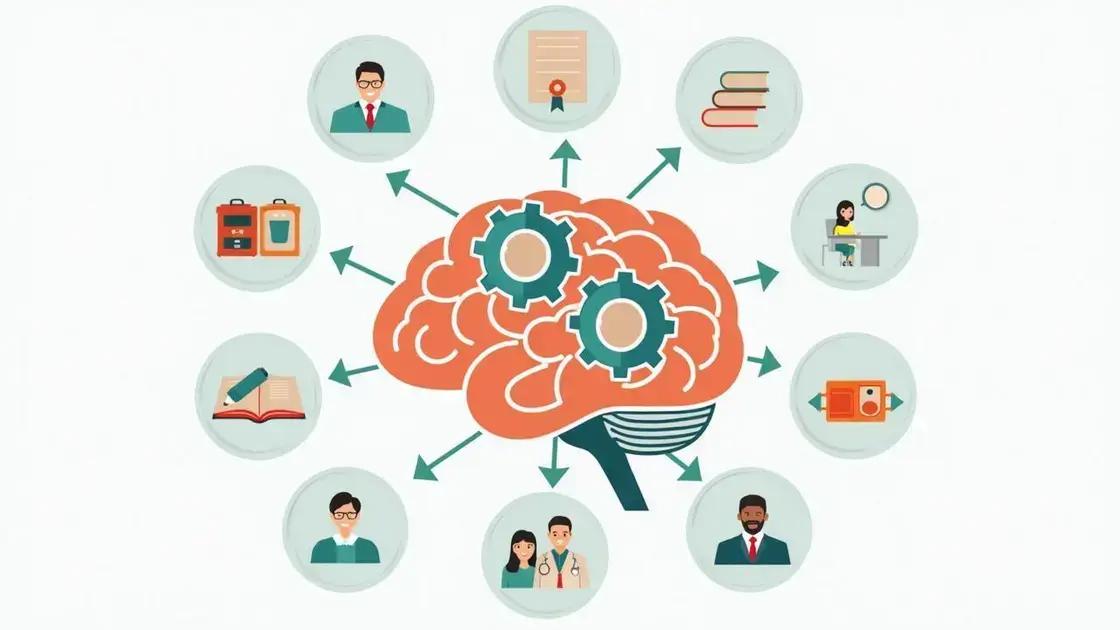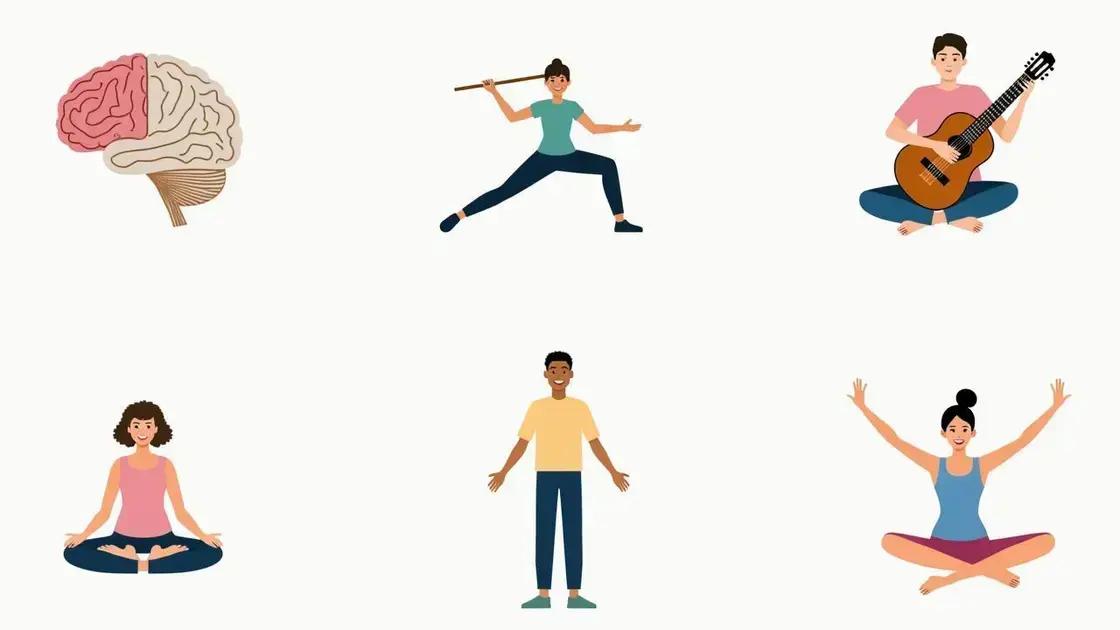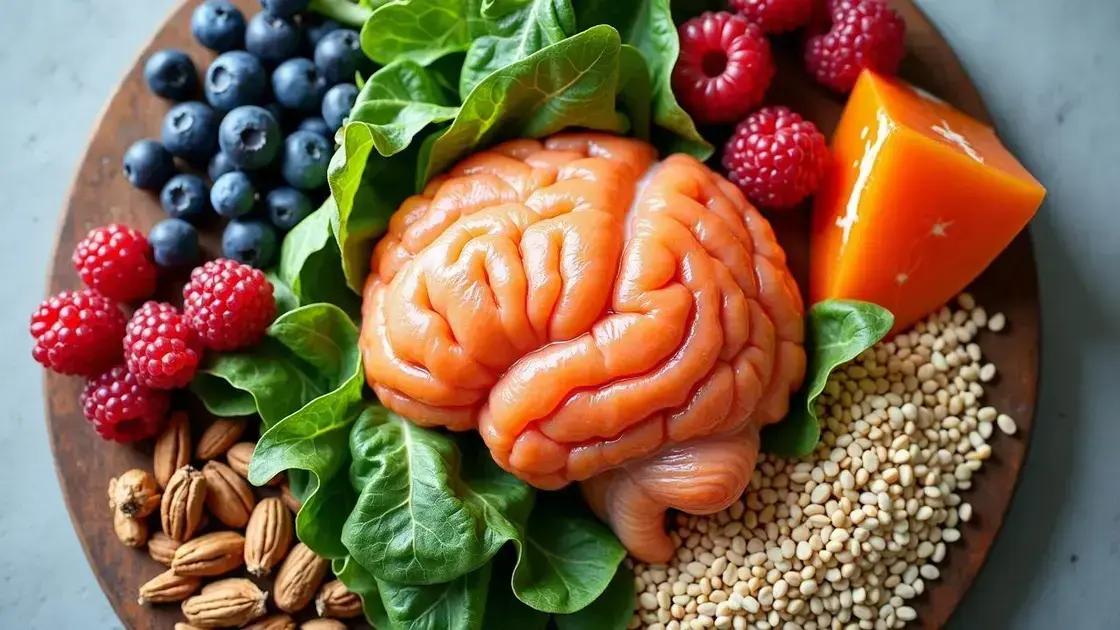To keep your brain sharp after 50, focus on a balanced diet rich in healthy fats and antioxidants, engage in regular physical and mental exercises, and maintain an active social life to support cognitive health and prevent decline.
Keeping your brain sharp after 50 is crucial for maintaining a high quality of life as you age. As we grow older, cognitive decline can become a concern. However, there are numerous strategies that can help enhance your mental agility and overall brain function. In this article, we delve into the importance of understanding cognitive decline, explore effective lifestyle changes, discover beneficial exercises, and highlight the role of nutrition in supporting brain health.
Understanding Cognitive Decline After 50

As we age, understanding cognitive decline after 50 becomes essential. Many people experience some level of decline in memory or cognitive abilities during their later years. This can be a natural part of aging, but it is important to differentiate between normal aging and potential medical issues.
What Causes Cognitive Decline?
There are several factors that can contribute to cognitive decline. These include:
- Natural Aging: The brain undergoes physical changes with age, leading to slower processing speeds.
- Health Conditions: Conditions like diabetes, hypertension, and heart disease can affect brain health.
- Medication Side Effects: Some medications can impair cognitive function; consult with a doctor if you suspect this.
Signs of Cognitive Decline
Being aware of signs can help in early intervention:
- Lapses in memory, such as forgetting names or appointments.
- Difficulty concentrating or following conversations.
- Struggles with problem-solving or planning.
Recognizing these signs and understanding their causes is the first step in maintaining cognitive health. Seeking professional advice or testing can provide insights and promote proactive strategies for enhancing brain function.
The Importance of Cognitive Awareness
Maintaining awareness about cognitive changes allows for timely actions. Engaging in brain-boosting activities, fostering social connections, and leading an active lifestyle can help. Remember, understanding cognitive decline is vital for staying mentally sharp and fulfilling daily activities.
Lifestyle Changes to Boost Brain Health

Making lifestyle changes can significantly boost brain health, especially after 50. Simple adjustments to daily habits can enhance cognitive function and overall well-being.
Stay Physically Active
Regular exercise is crucial for brain health. Aim for at least 150 minutes of moderate aerobic activity each week. Activities like walking, swimming, or cycling not only improve blood flow but also promote the growth of new brain cells.
Prioritize Sleep
Quality sleep plays a key role in cognitive function. Aim for 7-9 hours of sleep per night. Good sleep helps consolidate memories and clear toxins from the brain. Establish a relaxing bedtime routine and try to stick to a consistent sleep schedule.
Manage Stress
Chronic stress can harm your brain. Find ways to manage stress through techniques like meditation, yoga, or deep-breathing exercises. Taking time for hobbies or mindfulness activities can also reduce stress levels.
Stay Socially Active
Social engagement is important for brain health. Spend time with family and friends, and participate in group activities or volunteering. Socializing reduces feelings of loneliness and provides mental stimulation.
Avoid Harmful Habits
Certain habits can negatively impact brain health. Limit alcohol consumption and avoid smoking, as both can impair cognitive function over time. Making healthier lifestyle choices and avoiding harmful substances will support cognitive health.
Keep Your Mind Engaged
Engaging in mentally stimulating activities is important. Consider reading, puzzles, or learning new skills. Challenging your brain can create new pathways and improve cognitive function as you age.
Exercises for a Sharper Mind

Exercising your mind is just as important as exercising your body. Engaging in specific activities can help sharpen your cognitive abilities and improve memory.
Brain-Training Games
Games like Sudoku, crossword puzzles, and memory games challenge your brain. These activities stimulate neural connections and can enhance problem-solving skills.
Learn a New Skill
Taking up a new hobby, such as learning to play an instrument, painting, or speaking a foreign language, provides mental stimulation. It requires focus and practice, promoting cognitive growth.
Mental Math
Practicing mental math can improve your memory and brain agility. Try solving math problems in your head or doing calculations without a calculator. This exercise sharpens your thinking skills and boosts your confidence.
Mindfulness and Meditation
Practicing mindfulness and meditation can enhance focus and reduce stress. Try to spend a few minutes each day meditating. This practice improves concentration, enhances emotional health, and supports overall mental clarity.
Physical Exercises with Coordination
Physical activities that require coordination, like dancing or martial arts, are great for the mind. These exercises involve rhythm and memory, helping build stronger brain connections while improving physical health.
Join a Class
Taking classes—whether in cooking, art, or dance—promotes learning and social interaction. Engaging with others while acquiring new knowledge stimulates your mind and helps combat cognitive decline.
Nutrition’s Role in Brain Function

Nutrition plays a vital role in maintaining brain function, especially as we age. What you eat can affect memory, mood, and overall cognitive abilities.
Healthy Fats
Incorporate healthy fats into your diet, such as omega-3 fatty acids found in fish, walnuts, and flaxseeds. These fats support brain health and function, helping to reduce inflammation and improve memory.
Antioxidant-Rich Foods
Foods high in antioxidants, like berries, dark chocolate, and green leafy vegetables, protect the brain from oxidative stress. Include a variety of colorful fruits and vegetables to ensure you get sufficient antioxidants.
Whole Grains
Whole grains, such as oats, brown rice, and whole grain bread, provide a steady supply of glucose, which is essential for brain power. Opt for whole grains over refined grains for better energy levels.
Hydration
Staying hydrated is crucial for cognitive function. Drink plenty of water throughout the day. Dehydration can lead to reduced focus, memory issues, and fatigue.
Limit Processed Foods
A diet high in processed foods and added sugars can negatively impact brain health. Reduce your intake of sugary snacks, fast food, and fried items. Instead, focus on whole foods for better nutrition.
Consider Supplements
If you’re not getting enough nutrients from your diet, consider supplements like vitamin D, B vitamins, or fish oil after consulting with a healthcare professional. These can help support cognitive function.
In Summary: Keeping Your Brain Sharp After 50
Maintaining cognitive health after 50 involves understanding cognitive decline, making positive lifestyle changes, engaging in brain exercises, and ensuring proper nutrition.
By staying physically active, socializing, and continuously learning, you can keep your mind sharp. Additionally, fueling your brain with the right foods and limiting harmful habits will support overall mental agility.
With these strategies, you can enhance your cognitive function, boost brain health, and enjoy a fulfilling life as you age.
FAQ – Frequently Asked Questions About Keeping Your Brain Sharp After 50
What are some effective lifestyle changes to support brain health?
Incorporating regular exercise, managing stress, getting sufficient sleep, and staying socially active are effective changes to enhance brain health.
How does nutrition impact cognitive function?
Nutrition plays a crucial role in brain health. A balanced diet rich in healthy fats, antioxidants, whole grains, and hydration supports cognitive function.
What types of exercises are recommended for maintaining a sharp mind?
Engaging in brain-training games, learning new skills, practicing mindfulness, and physical activities that require coordination are all beneficial.
How important is social engagement for brain health?
Social engagement helps combat loneliness, promotes mental stimulation, and is associated with better cognitive function as you age.
Are there specific foods known to improve brain function?
Foods rich in omega-3 fatty acids, antioxidants, and whole grains are known to support brain health, such as fish, berries, and leafy greens.
What signs indicate cognitive decline?
Signs may include memory lapses, difficulty concentrating, and challenges with problem-solving. Recognizing these early can lead to timely interventions.












